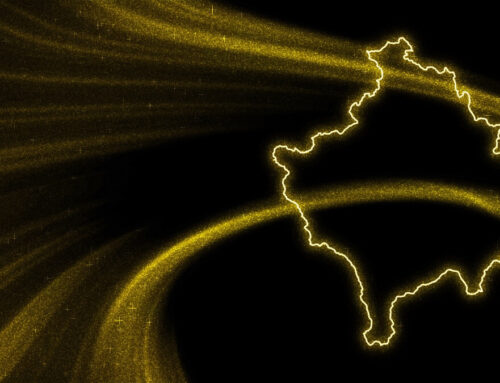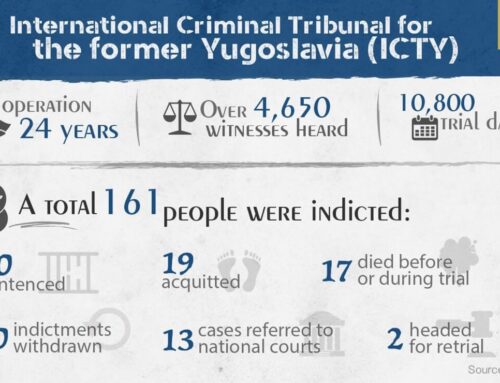After a two-decade-long dispute and strained bilateral relations, with international implications, the two neighboring countries, Greece and North Macedonia on June 17, 2018, found a modus to reconcile and to open a new historic chapter in the contemporary history of the Balkans. The stakeholders, led by the Prime ministers- Tsipras and Zaev, and the Ministers of Foreign Affairs- Kotzias (being of charge during that period of time), and Dimitrov succeeded to make a historic agreement, a two-sided compromise, based on the change of name of the country from Macedonia (or, internationally recognized as FYROM- Former Yugoslav Republic of Macedonia) to North Macedonia. Under Article 2 of the Prespa Agreement, Macedonia changed its name to Republic of North Macedonia with preserved Macedonian citizenship (as, citizens of North Macedonia), and Macedonian language, as a part of the group of South Slavic languages, in exchange for admission to NATO and a start to EU accession talks.
Changing its name, North Macedonia was recognized as a positive example, and a bridge-builder in the region, which efforts for peace and reconciliation should be put into practice from the other countries in the Western Balkans. As both countries agreed, and in accordance with the Article 20 of the Prespa Agreement, upon completion of the necessary internal legal procedures for the entry into force of this Agreement as set out in Article 1, the Parties shall, within two weeks and in writing, notify each other. This Agreement entered into force on the date of receipt of the last notification by the Party concerned.
After the procedures, including the positive result of the consultative state referendum, N.Macedonia started to implement the necessary changes- renaming the institutions, border crossings tables, signs, airport, and highway. In that regard, the Macedonian government renamed the country’s main airport and a north-south highway, both previously named after Alexander the Great, the ancient ruler of Ancient Kingdom of Macedonia, celebrated in both countries. The Skopje’s airport was renamed International Airport Skopje and the highway became the Friendship Highway. However, the implementation of the Prespa Agreement is a long process, and the signs on official buildings, web pages, and printed materials, as well as the vehicle registration plates, passports and currency will be replaced over the coming period.
Importantly, the Macedonian government paid and continues paying the price of the Prespa agreement. Their political credibility, public opinion support, existence in power is being under continuous criticism, dominantly from the main opposition party, but also from the Macedonian diaspora living abroad. On the other hand, a part of the Government supporters, SDSM (The Social Democratic Union of Macedonia) voters, and other individuals are not prone to refrain their criticism also, accusing the Macedonian government of not accomplishing the pre-electoral promises, implementing the necessary economic, social and political reforms.
Being marked as a bright example in the Western Balkans, and after accomplishing the necessary prerequisites as subsequent measures of the Prespa Agreement, North Macedonia was promised to be granted with negotiations talks from the European Union in June 2019. The last political circumstances, alluding on Brexit crises and the elections in the European Parliament, it seems that not only N. Macedonia, but also the other Western Balkan countries are (once again) not a top priority for Brussels and for the EU officials. Moreover, the major events in the EU, have shown that the EU once again vanished its interest towards the Western Balkan enlargement in the European Union. Recalling the Macedonian example, and the way that Macedonian government and the Macedonian citizens succeeded to improve the country’s image in the sphere of the international relations from state capture and stabilitocracy to positive example, if the EU does not provide encouraging steps for North Macedonia, based on the necessary start of negotiation talks for further Macedonian progress into the EU, not only that Macedonian citizens will continue to lose their enthusiasm and interest in the EU enlargement strategy, but North Macedonia may also repetitively remain stuck in the process of EU enlargement. Nevertheless, Macedonian government should still make a tremendous effort in order to build better judicial, healthcare, education system, and to implement crucial measures in the field of rule of law, social justice, democratic governance, freedom of media. On the other hand, the EU, with its politics of positive EU conditionality can contribute significantly to this process. Following the dominantly positive release of the European Commission for North Macedonia for 2018, it deems that the positive EU conditionality in this phase of Macedonian path towards EU integration is inevitable.
In the meanwhile, the political divisions among the citizens continue. According to the recent events, and the glorifying win of the Macedonian handball team on the European handball championship in man category only straightened the position of the national fans. The national fans, gathered on the main square in Skopje, not only that celebrated the victory of the team, but they also did not except themselves of using hate speech, but also loudly to emphasize- Never North, always Macedonia. Also, the politicians from the main opposition party- VMRO-DPMNE (Internal Macedonian Revolutionary Organization – Democratic Party for Macedonian National Unity), continue to ignore and in their vocabulary to use the previous name of the state- Macedonia, for internal, as well as for external use, in front of the EU officials in Brussels.
Additional worrying fact for the Macedonian government is that SDSM’s candidate Stevo Pendarovski, only with a small number of votes succeeded to win the opposition candidate, Gordana Siljanovska on the state presidential elections on 21 April and 5 May 2019. This situation also testifies that the great number of Macedonian citizens do not share the particularly positive opinion about Prespa agreement, as well as the EU commitment in the region.
Eventually, disregarding the recent events in the Macedonian political climate, following the previous waves of enlargement- big bang enlargement in 2004 and the entrance of Bulgaria and Romania in the EU in 2004, Macedonia (together with Albania) deserve and should receive a green light, in order to open the negotiation talks with the EU. In opposite, not only that the successful end and the long term sustainability of the Prespa agreement will be put under question, but the fragile situation may also be used by other important geopolitical players. And finally, the EU cannot use the pale rhetoric for the good/bad moment of enlargement. The internal crises of the EU will not be resolved overnight, and the Western Balkans neither can significantly contribute, nor can significantly worsen the situation.
For the last, for North Macedonia, for Greece, as well as for the EU, June 17, 2019, would have been better recognized if the EU would have been able to give a positive sign to the country, and if the Macedonian government provided the internal reforms in the country.





Leave A Comment